Ready, set, bake! Learning maths through baking.

It's the Great British Bake Off final tonight! We're all big fans of Bake Off here at Maths Week Scotland, not least because there are a multitude of maths and numeracy skills involved in baking - from weighing, measuring and counting, to fractions, conversions, telling the time and more!
We were delighted to see so many schools sharing their baking skills during Maths Week Scotland this year. Here are some of the ways that baking can help you learn maths:
Weighing and Measuring
A large part of baking is weighing and measuring out ingredients. Unlike some cooking, where you can throw in a pinch of this or a dash of that, baking requires exact measurements.
Depending on their age, children can read the quantities required in a recipe, and measure out that amount with a set of scales or in a measuring jug. You might also need to balance the scales for each ingredient.
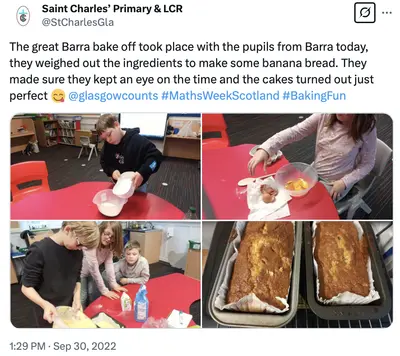
Counting
Some ingredients are counted in units instead of being weighed in grams or measured in millilitres, for example a recipe might ask for “2 eggs”. Or if your recipe uses teaspoons, tablespoons and cups as measurements, you might be asked for “4 teaspoons” or “2 cups” of something.
You can extend the counting further, by asking children to count out the number of cupcake cases needed or the number of cookies in a batch.
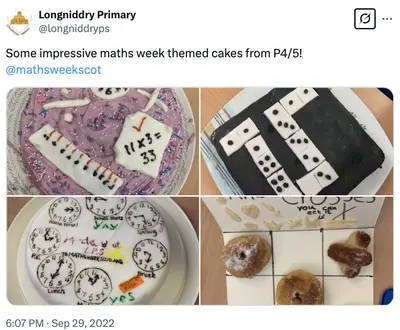
Fractions
Speaking of spoons and cups, these also introduce fractions to baking, with 1/8, 1/4 and 1/2 teaspoons, 1/2 tablespoon, or 1/4, 1/3 and 1/2 cup being measurements that typically appear in recipes. You can encourage children to make connections between these measurements, for example if a recipe calls for 1.5 teaspoons they could three 1/2 teaspoons instead. Fractions also come in to baking later, when you are serving up, such as slicing a cake in to quarters or eights.
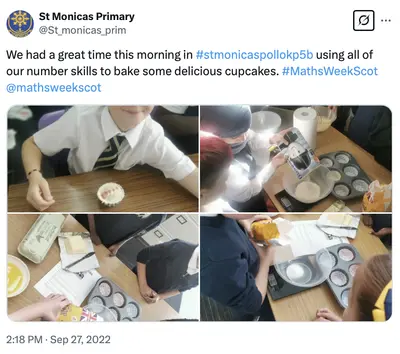
Conversion
When you are baking, you may want to scale up or scale down a recipe to fit your cake tin, if your tin bigger or smaller than the one in the recipe (though be aware that this can affect baking time). Or if you are baking cookies or cupcakes you might want to double or triple the recipe to bake more batches.
Halving a recipe can be more difficult than doubling, because some ingredients can’t be halved, such as eggs. Is there another way to scale down your recipe? For example, if your recipe uses 3 eggs, could you reduce it by a third?
Conversion could also be required if your recipe uses different units of measurements than you have on your scales or your oven, for example converting between ounces and pounds, and grams and kilograms, or converting between Fahrenheit and Celsius temperatures.
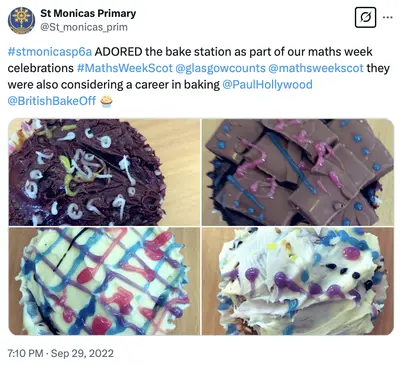
Some other maths skills involved in baking include:
- Budgeting for ingredients
- Setting the correct temperature on your oven (with adult supervision)
- Dividing batter equally among baking tins
- Estimating how how many cupcakes or cookies a batter or dough will make
- Identifying shapes, such as round cookies or square brownies
- Pattern sequences or symmetry when decorate your bakes
Why not try your own hand at baking! If you need a recipe to start you off, check out the cake recipe that Great British Bake Off winner Peter Sawkins shared for National Numeracy Day. Tag us on Bluesky or Facebook, and use the hashtag #MathsWeekScot, to share pictures of your bakes with us.
Latest News and Events
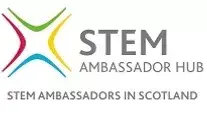
STEM Ambassadors in Scotland Week 2026
STEM Ambassador in Scotland (SAIS) Week is a celebration of all things STEM in Scotland through the experiences of our STEM Ambassadors.
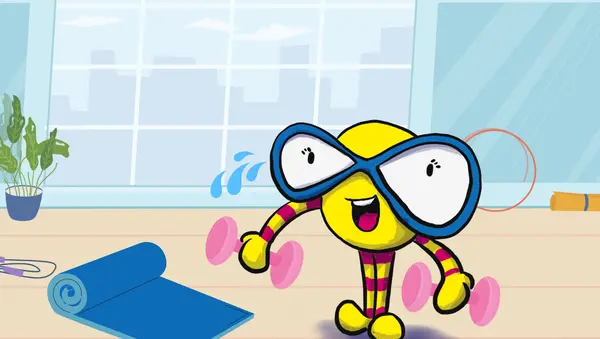
Active Maths Challenge
Start the year with our mini Active Maths challenge and measure what progress you can make over four weeks.
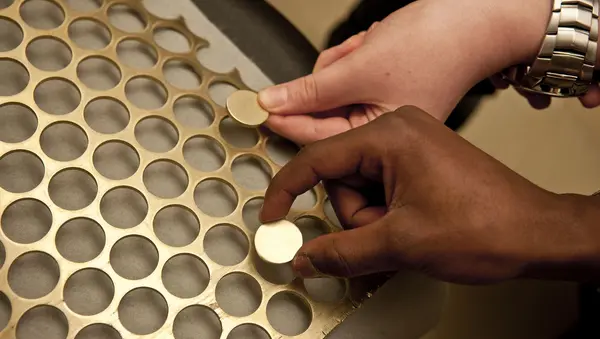
Money Maths at Museum on the Mound
We are excited to offer Maths versions of our popular money-themed schools workshops. These are entirely free of charge. Best suited for P5-P7 pupils.